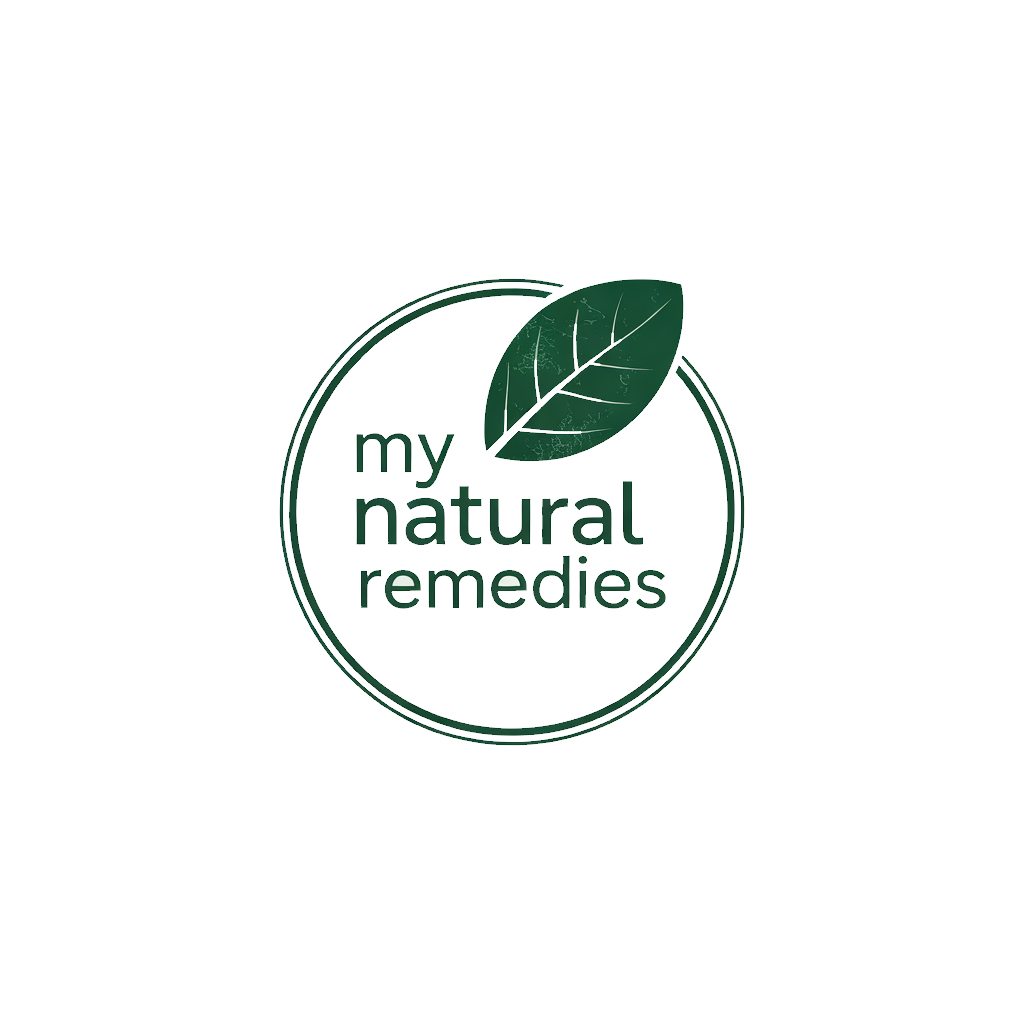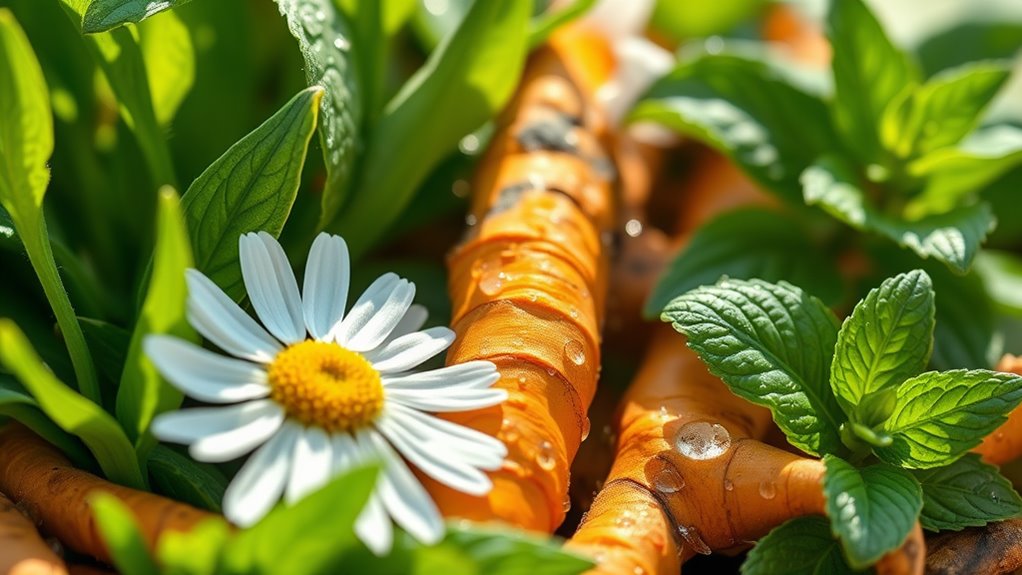12 Natural Allergy Soothers You’ll Wish You Knew Before!
You can tackle allergies like a champ with these 12 natural soothers! Start with local honey, which helps build immunity to regional pollen, and don’t underestimate the power of quercetin-rich foods, like apples and berries—they’re your secret weapon against histamines. Apple cider vinegar can calm that pesky mucus, while hydration from water and herbal teas eases sneezing and congestion. Don’t forget a saline nasal rinse to clear out allergens or steam inhalation to soothe irritated airways. With these tips, allergy season might just become a breeze. Stick around to discover even more ways to feel better in no time!
Local Honey Benefits
Local honey offers several benefits that can help alleviate allergy symptoms. When you choose local honey, you’re not just enjoying a sweet treat; you’re also supporting your community. Different honey varieties, like wildflower or clover, contain pollen from your area. This means your body gets a little taste of the allergens that usually bother you. It’s like a friendly introduction to the local pollen party!
By consuming local honey regularly, you might just build up your immunity to those pesky allergens. It’s a bit like training for a marathon, but instead of running, you’re sweetening your tea or drizzling it over toast. Plus, it’s delicious!
You know that feeling when your nose gets all stuffy, and you can’t breathe? Well, incorporating local honey into your diet may help reduce those allergy symptoms, letting you enjoy the great outdoors again. Just imagine yourself breathing easy while everyone else is sneezing away.
Saline Nasal Rinse
When allergy season strikes, a saline nasal rinse can be a game-changer for relieving congestion and irritation. You might be wondering how this simple solution can make such a difference. Well, let’s dive into the saline benefits and why nasal hygiene matters!
- It clears out allergens like pollen and dust.
- It helps moisten dry nasal passages.
- It can reduce sinus pressure and headaches.
- It’s safe and easy to use at home.
Using a saline rinse is as easy as pie! You just mix salt with warm water, pour it into a neti pot or squeeze bottle, and gently rinse your nostrils. Trust me, your nose will thank you! You’ll feel fresher, breathe better, and even sleep more soundly. Plus, it’s a natural way to keep your nasal passages clean and clear.
Quercetin-Rich Foods
Quercetin-rich foods can be your secret weapon against allergy symptoms. This powerful antioxidant helps reduce inflammation and block histamines, which means it can help you breathe easier during allergy season. Who wouldn’t want that? You can find quercetin in many tasty foods, so you won’t have to sacrifice flavor for relief.
Some of the best quercetin sources include onions, apples, berries, and leafy greens. Just think about adding some crispy onions to your salad or munching on an apple for a snack. Even better, red wine contains quercetin, so you can enjoy a glass while still fighting those pesky allergies!
The quercetin benefits don’t stop there. It may also help support your immune system and improve overall health. By including more quercetin-rich foods in your diet, you’re not only tackling allergy symptoms but also boosting your well-being.
Apple Cider Vinegar
Apple cider vinegar (ACV) is a versatile remedy that many swear by for easing allergy symptoms. If you’re tired of sneezing and itchy eyes, this might just be your new best friend! Here’s why people love it:
- Supports your immune system
- Helps reduce mucus production
- Balances your body’s pH levels
- Offers various health benefits
Using apple cider vinegar is simple and can be done in a few ways. You can mix one to two tablespoons of ACV in a glass of water and drink it daily. This not only hydrates you but also helps clear out allergens from your system. Some folks even use it as a salad dressing—who knew fighting allergies could taste so good?
But remember, it’s important to start slowly. Too much vinegar might upset your stomach, and nobody wants that! You’ll likely find that incorporating ACV into your routine can help you feel more comfortable during allergy season. So why not give it a try? You might just join the ranks of those who can’t stop raving about the health benefits of apple cider vinegar!
Essential Oils for Relief
If you’re looking for additional natural remedies to tackle allergy symptoms, essential oils might be just what you need. Many people find these oils offer soothing relief from sneezing, itchy eyes, and congestion. You can use them in a diffuser, creating lovely diffuser blends that fill your space with calming scents. Lavender, eucalyptus, and peppermint are popular choices that can help you breathe easier.
Inhalation techniques are another great way to enjoy the benefits of essential oils. Simply place a few drops on a tissue and inhale deeply, or add some to a bowl of hot water and lean over it with a towel draped over your head. Just be careful not to get too close; it’s not a sauna!
Plus, you can mix oils to create your own blends, making it feel like you’re a mini aromatherapist. Remember, though, that everyone’s allergies are different. So, it might take some trial and error to find what works best for you. Embrace the journey, and you could discover a natural remedy that makes your allergy season a whole lot easier!
Probiotics and Allergies
You might be surprised to learn that your gut health plays a big role in your allergies. Probiotics can help support your immune system, making it easier for you to handle those pesky pollen and pet dander. Plus, there are different types of probiotics, so you can find the right one that suits your needs—it’s like picking the perfect snack for your tummy!
Gut Health Connection
A healthy gut plays a crucial role in managing allergies, and probiotics are at the forefront of this connection. When you take care of your gut microbiome, you’re helping your body fight off allergies, which is pretty cool! Probiotics can boost your digestive enzymes and reduce gut inflammation, making you feel better overall.
Here are some great ways to support your gut health:
- Include more fermented foods like yogurt and kimchi in your diet.
- Don’t forget your fiber intake; it helps feed beneficial gut bacteria.
- Add prebiotic foods like garlic and onions to your meals.
- Be mindful of leaky gut, as it can lead to food sensitivities.
These actions can help with immune modulation, too! Plus, there’s something called the gut-brain connection, which means your gut health can even affect your mood. It’s all connected, like a big, happy family. So go ahead, embrace those probiotic-rich foods and watch your allergies take a backseat. After all, who wouldn’t want to feel better and more connected to their body? Your gut will thank you, and so will your nose!
Immune System Support
Tapping into the power of probiotics can significantly bolster your immune system, especially when it comes to managing allergies. You might be wondering how these tiny bacteria can help you feel better. Well, when you keep your gut happy with probiotics, you’re not just improving digestion; you’re also giving your immune system a boost! A strong immune system is your best friend in fighting off those pesky allergens.
Plus, let’s talk about stress. We all know that stress can make allergies worse, right? Probiotics can help with stress reduction too. When your gut is balanced, your body handles stress better, which means you might sneeze less and enjoy life more.
Types of Probiotics
Probiotics come in various strains, each offering unique benefits for allergy management. It’s like having a team of little helpers in your gut, ready to fight allergens! Here are some popular probiotic strains you might want to know about:
- Lactobacillus: Great for boosting immune response.
- Bifidobacterium: Helps reduce inflammation and allergy symptoms.
- Saccharomyces boulardii: A yeast that supports gut health.
- Streptococcus thermophilus: Aids digestion and can improve allergic reactions.
When exploring probiotic sources, you’ll find options like yogurt, kefir, sauerkraut, and even probiotic supplements. Each strain can impact your body differently, so it’s essential to find what works best for you!
Herbal Teas to Try
Explore the soothing benefits of herbal teas that can help alleviate allergy symptoms. When pollen’s in the air, a warm cup can feel like a hug! Herbal tea benefits include easing congestion and calming those pesky itchy eyes. Chamomile is a great choice, known for its anti-inflammatory properties. Just imagine sipping on a cozy cup while letting the warmth wash over you.
To prepare your tea, simply steep one to two teaspoons of dried herbs in hot water for about five to ten minutes. You can also add honey for extra sweetness and throat-soothing power. Want to kick it up a notch? Try peppermint tea! It’s not only refreshing but can help open those nasal passages too.
Another favorite is ginger tea, which can help reduce sinus inflammation. Grab some fresh ginger, slice it up, and let it brew. Don’t forget to share your herbal tea finds with friends! You might just spark a tea party that turns into a delightful ritual. So, the next time allergies strike, remember these herbal tea tips. You’ll feel like part of a cozy community, sipping away your sniffles!
Omega-3 Fatty Acids
Omega-3 fatty acids are a powerful ally in your battle against allergies. They’re known for their ability to reduce inflammation, which can help ease those pesky allergy symptoms. If you’re looking for some tasty ways to boost your omega-3 intake, check out these sources:
- Fatty fish like salmon and mackerel
- Chia seeds and flaxseeds
- Walnuts and hemp seeds
- Omega-3 supplements like fish oil capsules
Including these omega-3 sources in your diet can make a big difference. You don’t have to be a chef to enjoy them; simple meals can be both delicious and nutritious. If you’re not a fish fan, don’t worry! Omega-3 supplements are an easy alternative to help you get what you need.
Imagine feeling less congested and more in control during allergy season. With a little effort, you can join others who’ve discovered the amazing benefits of omega-3s. So, why not give them a try? You might just find that these little wonders are exactly what you need to feel better and breathe easier. Your body will thank you!
Steam Inhalation
Steam inhalation is a simple yet effective way to relieve allergy symptoms and improve respiratory health. If you’re feeling stuffy or congested, you might want to give this a try. It’s super easy and requires just a few steam inhalation techniques. All you need is hot water, a bowl, and a towel. Pour the hot water into the bowl, then lean over it, covering your head with the towel to trap the steam. Breathe deeply, and let that warm air work its magic!
The steam inhalation benefits are fantastic. Not only does it help clear your sinuses, but it can also soothe irritated airways, making it easier to breathe. Plus, it may even help with headaches caused by allergies. You’ll feel like you’ve just stepped into a spa, and who doesn’t love a little pampering?
Remember to keep the water at a safe temperature, so you don’t burn yourself. You can also add a few drops of essential oils like eucalyptus or lavender to make it even more relaxing. So, grab that bowl and give steam inhalation a whirl—you’ll be glad you did!
Acupuncture for Allergies
Have you ever wondered how acupuncture can help with allergies? It’s pretty fascinating! By using tiny needles at specific points in your body, acupuncture can boost your immune system and ease those pesky allergy symptoms, making you feel a whole lot better.
How Acupuncture Works
Acupuncture can play a significant role in alleviating allergy symptoms for many people. It’s all about balancing the flow of energy, or “qi,” along your body’s meridian pathways. When you visit an acupuncturist, they’ll use a special needle technique to target specific points that can help reduce those pesky allergy responses.
Here’s what you can expect from acupuncture:
- Relaxation: You might feel more at ease as your body starts to respond.
- Reduced Symptoms: Many folks notice less sneezing and itching after a session.
- Improved Immunity: Acupuncture can boost your immune system, making you less sensitive to allergens.
- Holistic Approach: It’s a natural way to tackle those seasonal sniffles without relying on medications.
During your treatment, the acupuncturist inserts fine needles at specific points, allowing energy to flow freely. This helps clear blockages and promotes healing. You don’t have to worry; it’s usually painless and can even feel soothing! If you’re looking for a way to feel better, acupuncture might just be the supportive friend you didn’t know you needed. So why not give it a try? Your body will thank you!
Benefits for Allergy Relief
When it comes to finding relief from allergies, acupuncture offers several compelling benefits. First off, it’s a natural remedy that taps into your body’s own healing abilities. You might be surprised to learn how many folks have turned to acupuncture and found it helpful. This holistic approach not only eases allergy symptoms but also helps reduce stress and boosts your overall well-being.
Imagine walking into a calm room, taking a deep breath, and letting those tiny needles work their magic. You’ll likely feel more relaxed, and that’s a win on its own! Plus, acupuncture can help balance your immune system. This means fewer sneezes and sniffles when pollen season rolls around.
Some people even notice improvements after just a few sessions. Isn’t that awesome? You’re not just treating the symptoms; you’re addressing the root causes. So, if you’re looking for a way to connect with natural remedies and feel part of a supportive community, acupuncture might just be the answer. It’s time to give your allergies the boot and enjoy the outdoors again!
Vitamin D Sources
With a little sunlight, you can boost your vitamin D levels naturally, which is essential for supporting your immune system and managing allergies. It’s like giving your body a little sunshine hug! But if you’re not catching rays every day, don’t worry. There are plenty of other great vitamin D sources you can add to your diet.
Here are some delicious options:
- Fatty Fish: Salmon, mackerel, and sardines are not only tasty but packed with vitamin D.
- Egg Yolks: Next time you make breakfast, don’t skip the yolk—it’s a little treasure of vitamin D.
- Mushrooms: Some types of mushrooms, especially those exposed to UV light, are great sources too.
- Fortified Foods: Many cereals and milk products are fortified with vitamin D, giving your breakfast a boost!
These vitamin D sources can help you enjoy the benefits like a stronger immune system and less allergy trouble. So, go ahead and soak up that sunlight, or enjoy some yummy foods! Your body will thank you, and you’ll feel more connected to the world around you.
Hydration and Allergies
Staying hydrated is super important, especially when you’re dealing with allergies. When you’re well-hydrated, it can help ease those annoying symptoms like sneezing and congestion. So, let’s chat about the best fluids to keep you feeling your best and how they can make a real difference!
Importance of Staying Hydrated
During allergy season, staying hydrated is crucial for managing symptoms effectively. You might not realize it, but simply drinking enough water can make a world of difference. Here are some hydration tips to keep you feeling your best:
- Drink at least eight glasses of water a day.
- Include hydrating foods like watermelon, cucumbers, and oranges in your meals.
- Try herbal teas as alternative water sources—they’re soothing and tasty!
- Keep a water bottle handy to remind yourself to sip throughout the day.
When you’re well-hydrated, your body can flush out allergens more easily. That means fewer sniffles and sneezes for you! Plus, hydration helps keep your mucous membranes moist, which acts like a defense against irritants.
Hydration’s Impact on Symptoms
How does hydration really affect your allergy symptoms? You might be surprised to learn that staying well-hydrated can make a big difference! When your body’s fluid balance is off, it can lead to thicker mucus and congestion, which are not fun when you’re battling allergies. So, if you’re feeling stuffed up, drinking enough water might just help clear things up.
Hydration effects don’t stop at just mucus. Proper hydration helps your body flush out allergens and keeps your skin healthy, too. If you’re dehydrated, your skin might get dry and itchy, making allergy symptoms feel even worse. Plus, a well-hydrated body can better manage inflammation, which often accompanies allergic reactions.
Best Fluids for Relief
When it comes to managing allergy symptoms, not all fluids are created equal. Some drinks can actually help you feel better while keeping you hydrated. Here’s a quick list of the best fluids for relief:
- Water: The ultimate hydrating hero!
- Herbal infusions: Chamomile and peppermint are soothing and can help clear your sinuses.
- Bone broth: Packed with nutrients, it’s a warm hug in a cup.
- Coconut water: Hydrating and full of electrolytes, it’s like a tropical vacation for your body.
Staying hydrated is key when battling allergies. It helps thin mucus and flush out allergens. Herbal infusions, especially those rich in immune boosters, can enhance your body’s defenses. Drinking these soothing teas can be a comforting ritual, making you feel part of a community that values natural remedies.
Frequently Asked Questions
How Quickly Can Natural Remedies Relieve Allergy Symptoms?
Natural remedies can vary in timing effectiveness, often providing relief within minutes to hours. However, symptom duration may still linger, so it’s essential to find what works best for you and your unique needs.
Are There Any Side Effects of Using Natural Allergy Soothers?
When using natural allergy soothers, be mindful of possible side effects and potential interactions with other medications. It’s always wise to consult a healthcare professional to ensure you’re making safe choices for your health.
Can I Combine Multiple Natural Remedies for Better Results?
You can definitely combine multiple natural remedies for better results! Many find that remedy combinations create synergy effects, enhancing their effectiveness. Just be sure to listen to your body and adjust as needed for optimal relief.
How Do I Know Which Natural Remedy Is Best for Me?
To find the best natural remedy for you, explore herbal selections that resonate with your personal preferences. Experiment with different options, and don’t hesitate to seek advice from friends or communities who share similar experiences.
Are Natural Remedies Effective for All Types of Allergies?
Natural remedies aren’t universally effective for all allergy types. Their herbal efficacy varies, so it’s essential to explore which remedy resonates with your specific needs. Finding the right one can foster a sense of belonging in your wellness journey.





